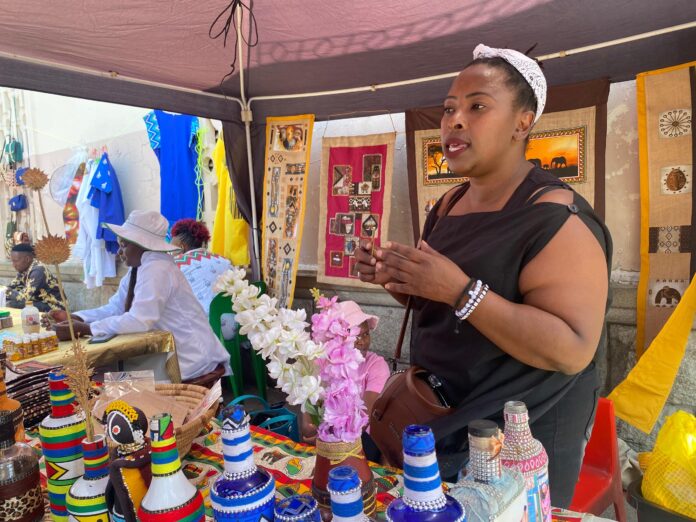On a table in a small workshop in Mahatshula North, discarded glass bottles gleam with fresh life. Once cast aside as waste, they are now wrapped in wool, beaded, or painted with striking geometric patterns. Each bottle has been transformed into an ornament fit for a coffee table, television stand or hotel reception.
This transformation is the work of founder of The African Queen Recycling Queens, Sukoluhle Ncube, a company that recycles glass bottles and other waste into decorative and functional items.
“An empty bottle may look like rubbish, but to me it is the beginning of something beautiful,” she says, holding up a bottle decorated in the bright reds, blues, yellows and blacks that are the signature of Ndebele art.
A Pandemic Spark
Ncube’s business was born in 2020, during Zimbabwe’s strict Covid-19 lockdowns. Confined at home with her family, she found herself staring at a collection of empty bottles. Movement restrictions had cut off work opportunities and many households struggled to make ends meet.
Then she remembered her past as a craftswoman. Two decades earlier, she had worked as a domestic employee for a Bulawayo family. Her employer, Mrs Elliot, once offered her several unused ostrich eggs. Inspired by similar items she had seen at local markets, Ncube painted them with her own designs and sold them as decorative pieces.
But ostrich eggs are fragile. “Clients would carry them home and they would break on the way,” she recalls. “I became discouraged.”
During lockdown, the memory returned. “I thought, if I could decorate eggs, why not bottles? Bottles are strong, they are everywhere, and people throw them away.”
The experiment became a lifeline. Neighbours admired her work, and soon buyers were placing orders. From that moment, The African Queen Recycling Queens was born.
From Trash to Treasure
The company has since grown into a small but steady enterprise. Today, it produces not only recycled bottle art, but also wall hangings, placemats, aprons, table cloths and runners, oven gloves, handmade gift cards and beaded bags.
“You can use them to decorate your living room, dining table or hotel reception,” Ncube explains. “It is something that can turn an empty space into beauty.”
Her designs often carry cultural meaning. One of her most popular lines is inspired by the Ndebele people’s bold and colourful motifs. “It is our identity,” she says. “I wanted my work to carry our culture as well as care for the environment.”
Hotels and lodges have become some of her most loyal clients, purchasing her creations to decorate guest rooms and lounges.
Teaching Others
But Ncube insists that her company is not just about selling products. It is also about equipping others with skills.
Under the motto “Learn how to recycle bottles and become a recycling guru”, she offers group lessons where participants pay about US$10 each. Each trainee receives a free starter pack to help them begin their own recycling journey.
“You cannot be greedy with something like this,” Ncube says firmly.
She continues, “If I pick up 20 bottles, and you pick up 20, and another person picks up 20, together we are cleaning the environment. We are reducing waste, and we are creating opportunities for ourselves.”
Her workshops attract women, young people and hospitality workers interested in sustainable decoration.
Beyond Lockdown
While the pandemic sparked her creativity, the business has survived and grown beyond it. Today, she continues to collect bottles across Bulawayo. Her workshop at Mahatshula North is filled with finished pieces ready for sale, alongside worktables where trainees learn to weave wool or paint bottles.
Challenges remain. Materials such as beads and paints are costly, transport can be unreliable, and small-scale artisans must compete with cheaper imported goods.
Still, Ncube persists. “What matters to me is that I am creating, I am teaching, and I am helping the environment,” she says.
Women at the Forefront of Climate Mitigation
Across Zimbabwe, waste management remains a major concern. The country produces thousands of tonnes of solid waste daily, much of it plastic and glass. Collection services are inconsistent, and open dumping is common.
In this context, women-led initiatives like The African Queen are filling an important gap. By recycling waste into useful products, they prevent pollution, extend the lifespan of materials, and raise awareness about sustainable living.
Environmental researchers note that small-scale recycling has a direct impact on climate change mitigation. By reusing glass bottles, less energy is required to produce new ones. Reducing waste sent to landfills also decreases methane emissions, a powerful greenhouse gas.
Across the continent, women are driving similar initiatives: in Kenya, women weave handbags from plastic bags, in Ghana, wrappers become colourful mats; in South Africa, collectives turn tyres into furniture.
Looking Ahead
Ncube dreams of opening a larger centre where artisans can create, exhibit and sell recycled goods while also offering regular training sessions. She hopes to expand her teaching to rural areas, empowering more women and young people to turn waste into wealth.
For now, her workshop continues to produce brightly coloured bottles, placemats and aprons that travel from Bulawayo into homes and hotels across Zimbabwe.
“Every piece tells a story,” she says, carefully arranging a bottle wrapped in rainbow-coloured wool. “It is a story of resilience, of culture, and of taking care of the earth.”
From ostrich eggs that broke too easily to bottles that endure, Ncube’s journey reflects a larger truth: when women innovate, they do more than decorate homes. They help clean cities, create livelihoods, and slow the warming of the planet.

